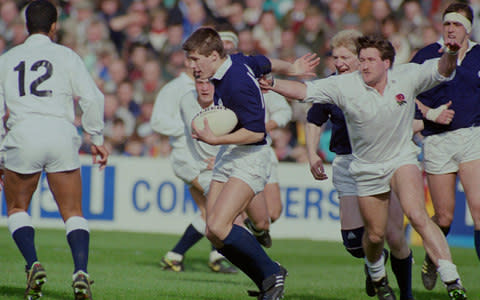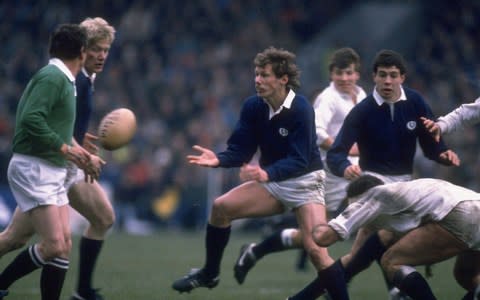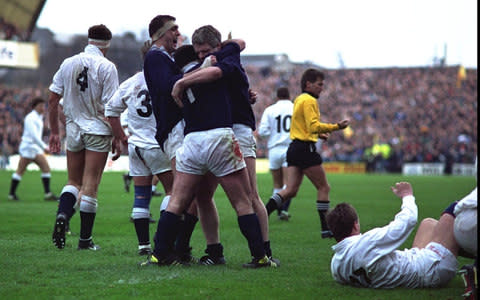I have a myriad of Calcutta Cup memories - England v Scotland has provided the highest of highs and lowest of lows

They say that rugby doesn’t build character, it reveals it. Nowhere is that more true than when it comes to the Six Nations in general and the Calcutta Cup in particular.
I played against England six times, winning two and drawing one, and coached Scotland against the Auld Enemy on 13 occasions. Your bitterest battles are against your nearest neighbours and I’ve won a Grand Slam against England, lost a World Cup semi-final, savoured my most joyous win and my suffered my most humiliating loss. I’ve coached against two of the best England sides of all time: the side of Dean Richards and Rob Andrew that won back-to-back Grand Slams in the early 90s, and that of Martin Johnson and Jonny Wilkinson which dominated world rugby from the late 1990s to their World Cup win in 2003.
But the narrative of virtually every one of those games has been the same. England would seek to crush the life out of us, to completely control the pace and direction of the game through their huge pack, and by kicking and controlling territory. We, on the other hand, would try to keep them guessing, frustrate them, play a quick game and run them off their feet.
The two sides that will meet at Murrayfield on Saturday are archetypal Scotland and England teams. Scotland are smaller, more mobile, determined to play at a high-tempo where they win quick ball with which to unleash their talented backs. England also have backs of real quality yet their first option will be to use their big men to overpower Scotland up front as they did against Wales. The men in white want to cut down the imponderables and remove the chance for Scotland to build momentum; as ever, their approach will be all about keeping control.

It may not always be obvious from the stands, but the players generally have huge respect for each other. Even the bursts of frustration, such as when Geoff Cooke called the famous Scottish back row of JJ, Fin and Derek White “scavengers” was said as much in admiration as genuine anger. And some of the bitterest on-field opponents are firm off-field friends – Finlay Calder and Brian Moore, or Scott Hastings and Jerry Guscott for example. And who can forget 1992 when JJ and Deano took the Calcutta Cup on a tour of Edinburgh’s bars which ended up with them kicking it up and down Rose Street and sliding the battered cup under the door of the jewellers.
The first ever match of international rugby – or any team sport for that matter – was the rugby international between Scotland and England played at Raeburn Place in Edinburgh in 1871. Scortlanf triumphed that day and although the balance of power has shifted decisively, with Scotland only winning three times since the 1990 Grand Slam game (although we should arguably have won in 1994, 1999 and 2016), after almost 150 years later the fixture still has a special place in the history of the game. It also has a special place in my memories of almost half a century since I first experienced the Calcutta Cup from the inside.
As a player
The only international I missed between my debut against the All Blacks in 1972 and my retirement in 1979 was the 1978 Calcutta Cup, when I had an Achilles injury. I came through the English system and played against the top clubs sides for Headingley, so playing England wasn’t a big deal for me. We should have won my first two games at Twickenham, both of which were for the Triple Crown, but in 1973 Bill Dickinson insisted on playing Ian McLauchlan when he had a broken leg, and in 1975 we outplayed England only to gift them a soft winning try. Our wins at Murrayfield in 1974 and 1976 were two of the best Scottish performances I’ve witnessed, with Andy Irvine’s match-winning penalty at the death in 1974 one of the highlights of my career.
(1973: Twickenham: England 20 Scotland 13; 1974 Murrayfield, Scotland 16 England 14; 1975: Twickenham , England 7 Scotland 6; 1976: Murrayfield, Scotland 22 England 12; 1977: Twickenham, England 26 Scotland 6; 1979: Twickenham, England 7 Scotland 7)

As a coach
1986, Murrayfield: Scotland 33 England 6
I was Derrick Grant’s backs coach. John Rutherford was in his pomp and bestrode this game like a colossus, and with seven new caps against France the week before – including the Hastings brothers, Fin Calder and David Sole - the 1990 side was taking shape. The weather had been horrendous but our backs were superb while our forwards dragged England’s big pack all over the park. Our support play was phenomenal and our back row was rampant. A good England side was left chasing shadows.
1987, Twickenham – England 21 Scotland 12
In World Cup year we experimented with playing five No.8s for added mobility, but England dominated possession, while Gary Rees slowed any ball we won. Dean Richards, Brian Moore and Rory Underwood had just come through.
1988, Murrayfield – Scotland 6, England 9
Derrick Grant was incredibly upset at England’s refusal to play rugby while the crowd booed this boring arm-wrestle. It was Will Carling’s first season as skipper and coach Geoff Cooke wanted to win at any cost so Rob Andrew kicked the leather off the ball and their big men – Skinner, Richards, Winterbottom, Dooley and Moore – stuck the ball up their jerseys. We played magnificently in 1988 but this was dire.

1989, Twickenham – England 12 Scotland 12
We did things England didn’t expect: a blitz defence one minute, out-to-in defence the next, Scott Hastings rushing out of the line the next. We disrupted and frustrated them. By stopping Rob Andrew, we stopped England.
1990, Murrayfield - Scotland 13 England 7
I’ve never felt a more powerful atmosphere than that day, although I stupidly argued against JJ’s idea for The Walk because we’d tried it in the first test with the 1989 Lions and it was a disaster. This time it galvanised the fans and as the match wore on and it became clear we weren’t going to be steamrollered, the crowd’s confidence grew and grew. England had blown sides away in the first 20 minutes so we successfully set out to keep the ball for the first 15 minutes. We learned the lessons of 1986 and 87 and never let them settle: Eddie Butler called it “organised chaos” which I loved. England learnt a harsh lesson because they had no Plan B.
1991, Twickenham – England 21 Scotland 12
This was the Calcutta Cup after the Grand Slam game and England had learnt their lesson. They had far more structure and moved the ball a bit but nowhere near as much as in 1990. They throttled us; this was a good side which wouldn’t allow us to disrupt them. This match was a microcosm of games between the two nations: England were all about control, we were about pace, dynamism and intensity.
1991, Murrayfield, World Cup semi-final – Scotland 6 England 9
Most people will remember this game for that dramatic moment when Gavin Hastings, having just been smashed by Micky Skinner, missed from in front of the posts at 9-6. But my memory is of Dean Richards, socks rolled down, coming off the bench with 20 minutes to go, and Jim Telfer saying that his heart just sank. Deano was an incredibly clever player, possibly the canniest I ever coached – he was my sounding board on the 1989 Lions – and his arrival made their win an inevitability. This was a good tactical duel but England had learnt the lessons of 1990, leaving me, Jim and the players devastated.

1992, Twickenham – England 25 Scotland 7
The side which won the Grand Slam and came within a whisker of winning in New Zealand was in decline and this English Grand Slam side was in its pomp. They got it right that day and showed that they were 15-20 points better than us, although my main memory was the presence of Derek Bevan, the referee who robbed us in Auckland and who was relentlessly unsympathetic to us that day too.
1993, Murrayfield – Scotland 12 England 26
England’s outstanding forwards beat us up and controlled the game. They scored three tries and Stuart Barnes’ match-winning performance got him onto that summer’s Lions tour.
2000, Murrayfield – Scotland 19, England 13
On my first game back we stopped England winning the Grand Slam on the last day of the tournament (as Wales did the previous year, and as France would do in 2001 and Ireland in 2002), but I don’t think we’d have won had Martin Johnson been playing, they missed him terribly. We picked the biggest pack possible and kicked to the touchlines so that 7ft Richard Metcalfe could contest their ball. England were experimenting with pods of forwards in midfield, so we played Gregor Townsend at outside centre where he rang rings around Neil Back. When the heavens opened at half-time we played outstandingly, with Duncan Hodge scoring all 19 points. A remarkable, red-letter day.

2001, Twickenham – England 43, Scotland 3
This was an awesome England side in top gear and their pace and physicality were too much for us. They were the best team in the world. Determined to atone for 2000, they inflicted the heaviest defeat of my coaching career. Not a great day.
2002, Murrayfield – Scotland 3, England 29
See above. This was an exercise in damage limitation, but Jason Robinson was absolutely exceptional, picking up two tries.
2003, Twickenham – England 40, Scotland 9
England would win the World Cup later this year and were untouchable. I just had to stand back and admire the awesome quality of their rugby.

 Yahoo Sport
Yahoo Sport 





































